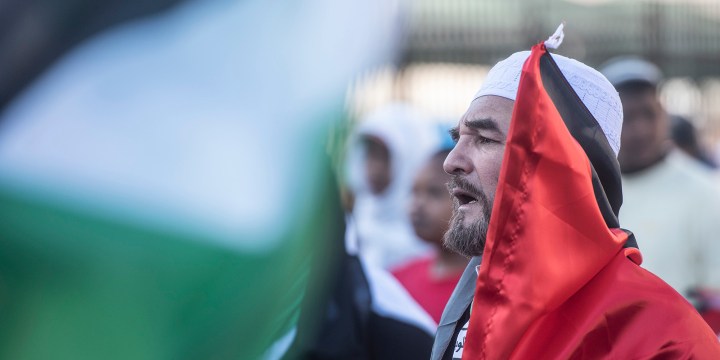MIDDLE EAST AFFAIRS OP-ED
South Africa out of step with its BRICS partners on relations with Israel and Palestine

Over the years, South Africa’s ruling ANC has come out increasingly strongly on the side of the Palestinians. It’s a different story with the other BRICS nations who all give support to the Palestinians, without cold-shouldering Israel.
From 22 to 24 August 2023, Johannesburg will host the 15th summit of the BRICS – the political bloc composed of Brazil, Russia, India, China and South Africa. The BRICS summits pronounce on many international issues, and the Israeli-Palestinian conflict has occupied a small but regular place in the ever-longer communiqués issued after these meetings.
The host nation has more than a little influence on the language that will be used, so expect some barbs and stings as the South Africans voice solidarity with the Palestinians. What the other four BRICS have managed to do, however, is to support the Palestinian cause rhetorically, but not let this get in the way of cordial, strong and profitable relations with Israel.
How has BRICS as a grouping characterised the situation in the Middle East? The language in the BRICS communiqués goes through waves. The issue is entirely absent in the first summit leaders’ joint statement in 2009, and only appears obliquely in 2011, after South Africa was admitted as a member.
In the 2013 eThekwini Declaration – the first time South Africa hosted a BRICS summit – there is much more specific mention of the conflict:
“We are concerned at the lack of progress in the Middle East Peace Process and call on the international community to assist both Israel and Palestine to work towards a two-state solution with a contiguous and economically viable Palestinian state, existing side by side in peace with Israel, within internationally recognised borders, based on those existing on 4 June 1967, with East Jerusalem as its capital. We are deeply concerned about the construction of Israeli settlements in the Occupied Palestinian Territories, which is a violation of international law and harmful to the peace process.”
Pro-Palestine language echoed in communiques
Much of this language is echoed (sometimes verbatim) in subsequent communiqués, along with more contemporary developments. In the 2016 Goa Declaration, the discussion is more muted and omits any mention of settlements. The 2017 declaration from Xiamen, China makes no mention of the 1967 borders – perhaps an indication of Israel’s growing closeness to China, or perhaps other priorities?
Then the conflict gets a full three paragraphs in the 2018 Johannesburg Declaration, with the plight of Palestinian refugees highlighted, but shrinks again to one paragraph in 2019 in Brasilía, Brazil and the 2020 Moscow Declaration. It got barely a whisper in 2021 in New Delhi and Beijing in 2022. Expect it to expand in 2023.
South Africa’s tense relations with Israel are long standing and no secret. The ANC has never forgiven or forgotten Israel’s closeness with the apartheid state. It refracts the conflict through the prism of its own experiences in the Struggle for liberation.
Over the years the party has come out increasingly strongly on the side of the Palestinians. This hampers Israeli efforts to share its knowledge and experience of technology in agriculture, water management and medicine, among others, with South Africa. South Africa called the Abraham Accords “concerning” and “regrettable”.
It’s a different story with the other BRICS partners. All give support to the Palestinians, without cold-shouldering Israel.
Brazil, especially under the centre-right rule of Jair Bolsonaro, drew closer to Israel, including militarily. Israel’s Prime Minister Benjamin Netanyahu visited Brazil in 2018, and Bolsonaro’s first foreign visit was to Israel in March 2019. Brazil can, however, be expected to be more overtly pro-Palestinian with the return to office of the leftist ‘Lula’ da Silva.
Israel-Russian ties long-standing and complex
Israel’s relations with Russia are long standing and complex. More than a million Russian Jews emigrated to Israel after the fall of the Berlin Wall. Netanyahu and Vladimir Putin have met many times, and the two countries worked even more closely after 2015 when Moscow deployed troops in the Syrian civil war.
Israel coordinates with Russia in the war-torn country as it operates to curb the power of the Iranian-backed Hezbollah. Israel has provided humanitarian aid (but not weapons) to Ukraine, and voted against Russia in the UN General Assembly. Nevertheless, Jerusalem has incurred the ire of Kyiv for a perceived pro-Moscow stance.
India-Israel ties have been steadily growing, after India finally recognised Israel in 1992. India is the world’s largest consumer of Israeli military equipment, and Israel is India’s second largest supplier, after Russia. The countries share intelligence on terrorist groups and conduct joint military exercises.
Prime ministers Narendra Modi and Benjamin Netanyahu exchanged highly publicised state visits in 2017 and 2018. India has also softened its stance vis-à-vis Israel at the UN in recent times. In 2021, along with the US and the UAE, the countries formed the I2U2 grouping.
As it takes on a larger international role, China has booming relations with the Jewish state as well as with the Palestinians and the Muslim and Arab world. As with India, formal ties were only established with Israel in 1992.
China has invested more than $15-billion in Israel’s economy, often supporting Israeli startup companies. It is a major builder of infrastructure in Israel. More than 1,000 Israeli companies – many of them startups – have established operations in China. Israel’s relations with China have not always pleased the US.
As the BRICS convene, it remains to be seen if South Africa’s stance towards Israel will soften. DM
Steven Gruzd is a political analyst at the South African Institute of International Affairs in Johannesburg. He writes in his personal capacity.

















I hope that they follow South Africa’s lead on this. We are on the right side of history on this.